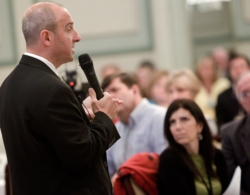Youth ministers meet to discuss challenges, create connections
RANDOLPH -- Nearly 100 people who are involved in youth ministry in the Archdiocese of Boston gathered for a day to reflect on their ministry and to share ideas with colleagues that could make their respective ministries more fruitful.
“It reinforces our mission,” said Jim Burke, a youth ministry volunteer at St. Joseph Parish in Holbrook. “It provides us with insight into each other’s experiences of what has been helpful and beneficial.”
The Office for the New Evangelization of Youth and Young Adults hosted its third annual Boston Symposium on Adolescent Catechesis April 29 at Lombardo’s.
Randy Raus, president of Life Teen, an international Catholic organization headquartered in Mesa, Ariz. that strives to lead teens closer to Christ, gave two talks at the symposium.
Andrea Alberti, campus minister and theology teacher at St. Mary High School in Lynn and youth minister at St. Thomas Aquinas Parish in Nahant, also spoke and four college students addressed the audience in a discussion format.
Stephen Colella, assistant director for the New Evangelization office, said that the purpose of the gathering was to bring people involved in various aspects of youth ministry together to discuss how to meet youth ministry’s challenges “in a head-on, positive way.” During the course of the day, participants discussed their observations of youth ministry with one other.
“One of the major benefits is the networking that happens,” said Paula Flanagan, youth minister at St. Ann and St. Zepherin Parishes, both in Wayland.
Megan Guilfoil, a member of the core team for the Life Teen program at St. Mary Parish in Dedham and a religion teacher and campus minister at the parish school, agreed.
“It was an opportunity to go to another training and pick up some ideas,” Guilfoil said.
Raus’ first talk of the day, “Rock Solid Catechesis: Historical and Cultural Foundations,” shared insight on the world in which teens live.
According to Raus, the teenage population is a constant target of advertising, are exposed to the world at a younger age and use Facebook, not e-mail, as a primary mode of communication. They do not respond to individualized peer pressure but societal pressure, see materialism as desirable, live in a “hook up” culture, and live double lives.
However, he said teens are “hungry for the truth” and today’s times present an opportunity for in-depth catechesis.
“Teenagers have never been easier to approach. A shift happened after Columbine and 9/11,” he said. “This is a great time of opportunity. The only thing is we have to bring the depth of faith into the relationship. How tragic if they come to find Christ and all they see is us.”
Raus’ second talk, which was delivered during the final session of the day, was entitled “Rock Solid Catechesis: How Do We Engage?”
During the talk, he encouraged the audience to engage their teens in a loving manner.
“They have to know that you care before they care what you know,” he said.
He also said that catechists cannot be in opposition with what the Church teaches, and encouraged them in frequent prayer, Mass attendance, and reception of the Sacrament of Reconciliation in their own lives.
He encouraged catechists to take a more experiential approach in communicating faith to young people, and incorporate less teaching and more prayer into their lessons.
Raus encouraged attendees to establish ongoing relationships with parents, and enlisting their assistance in youth ministry programs. He also suggested that teens be involved in leadership roles within youth ministry.
“It just has a ripple effect,” he said. “When we get other teenagers involved in the faith, it’s just contagious.”
At a discussion presented by four college students, the audience heard suggestions about how to be more effective evangelizers of today’s youth. The panel encouraged catechists to avail their youth to Eucharistic adoration, emphasize Church teachings, take their own faith seriously, teach students that faith should not be separate from their lives, and emphasize that students should have a personal relationship with Christ.
For those who attended, the symposium offered the chance to share experiences and suggestions for evangelizing today’s youth.
“Sometimes you feel totally alone,” Guilfoil said. “We’re coming across some of the same issues. It’s nice to know there’s support there.”



















